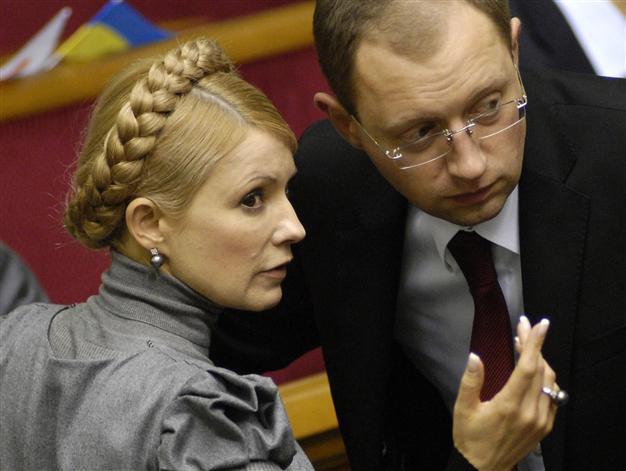Ukraine's jailed Tymoshenko on hunger strike: lawyer
KIEV - Agence France-Presse

In this Tuesday, Dec. 4, 2007, file photo, Yulia Tymoshenko, left, speaks with Arseniy Yatsenyuk, in the Verkhovna Rada, Ukrainian Parliament, Kiev. AP Photo
Ukraine's jailed ex-premier Yulia Tymoshenko has been on a hunger strike for five days to protest her treatment and demand an end to political repressions, her lawyer said today."Yulia Tymoshenko began a hunger strike on Friday," her lawyer Serhiy Vlasenko told AFP after visiting Tymoshenko in the eastern city of Kharkiv where she has been jailed since last year on abuse-of-office charges.
"It's an unlimited hunger strike. She is calling for an end to political repressions in Ukraine," her lawyer said.
The flamboyant but divisive 2004 Orange Revolution leader was jailed for seven years for negotiating a gas deal with Russia while prime minister in 2009 that the new administration says was against Ukraine's interests.
Tymoshenko, 51, has complained of debilitating back pain in jail and asked to have treatment abroad. She began a hunger strike after she said she was forcibly taken to a local hospital.
"I stopped eating on April 20 with just one aim, to draw the attention of the democratic world to what is happening in the centre of Europe, in the country known as Ukraine," she said in a statement on her website.
Tymoshenko complained of being beaten by prison staff and dragged to an ambulance against her will.
"Three strong men came up to my bed, threw a sheet on me and then started pulling me off the bed by force. In pain and despair I started defending myself as I could, and was hit hard with a fist in the stomach," she said.
"They tied up my arms and legs, lifted me up and dragged me out in the sheet," she said. "I thought the last minutes of my life had come." Last week, Tymoshenko's back pain kept her from appearing for the start of a new trial on tax evasion charges that could see her jail term extended from seven to 12 years.
But she has expressed fears that local doctors could poison her or infect her with a disease and demanded that the hospital be checked by a team of German doctors who examined her in prison earlier this year.
On Tuesday she said she had faith in the doctors and the medical equipment but warned of what she called constant violence and abuse organised by her arch foe, President Viktor Yanukovych.
The Ukrainian authorities have already been forced to deny suggestions that they were linked to the 2004 poisoning of former president Viktor Yushchenko, who was Tymoshenko's close ally during the pro-democracy protests.
Yushchenko's face became disfigured during his fight for disputed 2004 polls won by Yanukovych to be declared invalid. Yanukovych then made a remarkable comeback to politics, beating Tymoshenko in 2010 presidential polls.
Kharkiv chief prosecutor Hennadiy Tyurin confirmed Tuesday that Tymoshenko had refused to go to the clinic voluntarily, while denying any use of violence.
"According to the law and the criminal administrative code, the prison service has the right to use physical force," Tyurin said, quoted by Interfax. "They took her in their arms, carried her to the vehicle and took her to hospital." Tymoshenko's prosecution cast a shadow over Ukraine's relations with the European Union and prevented the signing of a partnership agreement as a step on the way to eventual membership for the ex-Soviet country.
The West criticised the original trial as selective justice, while Tymoshenko has branded the case the result of a political vendetta being waged by Yanukovych.
But prosecutors have brushed aside the complaints and have launched several new tax fraud and graft cases against Tymoshenko relating to her activities in the 1990s as head of a private natural gas trading firm.
















